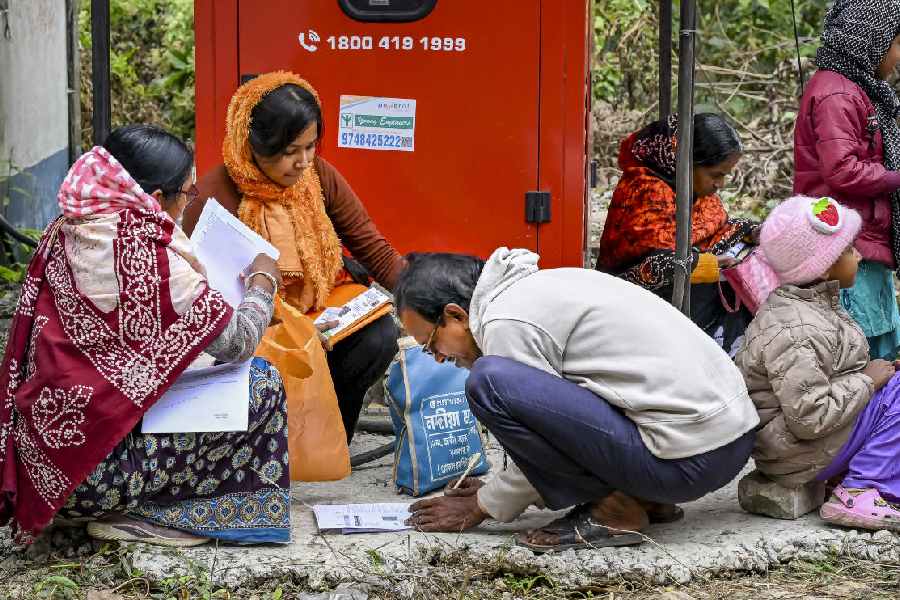 |
| PET CAUSE: PETA activists wearing beagle masks demand that the imported pups be given over for adoption |
Seventy beagle pups are frolicking around at a Chennai quarantine centre — blissfully unaware of a war that’s broken out over them. The pups — imported from China — have become the bone of contention between animal rights activists and a Bangalore-based contract testing laboratory.
Importing this sweet-natured British hound for lab testing is not illegal in India. But importers have to follow an elaborate set of rules and regulations laid down by the Committee for the Purpose of Control and Supervision of Experimentation on Animals (CPCSEA), a statutory body set up under the Prevention of Cruelty to Animals Act, 1960.
The importer in this case — Advinus Therapeutics Ltd — is being accused by pro-animal activists of flouting the rules. They may not be correct but it’s tough to determine who’s right and who’s wrong because Advinus has not given its version. It did not respond on the allegations despite repeated telephone calls and an email sent to the company by this correspondent.
The animal versus science debate is not exactly new. In 1998, Ranbaxy Laboratories faced the ire of animal rights activists and was forced to release its imported beagles because it had not obtained the required permission.
According to scientists, the procedure to get approval for procuring animals for scientific testing in India is lengthy and difficult. A laboratory that seeks to import relatively big animals like dogs first requires approval from its individually formed Institutional Animal Ethics Committees (IAEC), which comprises a CPCSEA member and a “socially aware” person, before sending the proposal to the CPCSEA.
The committee must be “satisfied that the minimum number of animals with statistically valid requirements are being used and the experiment is not repeated.” For imports, clearance by the Directorate General of Foreign Trade is also required.
The activists allege that Advinus imported the animals as “pets”. There was also a discrepancy in the number of beagles sanctioned and the number imported, says CPCSEA member secretary Anjani Kumar, director, animal welfare division, ministry of environment and forests. “We are investigating the matter,” he says.
 |
According to a CPCSEA member, speaking on the condition of anonymity, commercial breeder Beijing Marshall Biotechnology Company, in China, from where the beagles were imported, had declared in writing that the beagles would not be killed or used as laboratory animals.
The pre-quarantine certificate given by the Chennai quarantine centre, run by the agriculture ministry’s animal husbandry department, also refers to them as pets, the member states in an email to CPCSEA chairman M.F. Farooqui.
Beagles are often used for tests because they are docile and their physiological parameters are closer to humans. But the breed — familiar in parts of India because of Charles Schulz’s Snoopy — is expensive as India has only one beagle breeding centre in Hyderabad. Beagles in India cost about Rs 30,000; imported ones are priced at over Rs 50,000.
Advinus, which got CPCSEA permission to import the pups to allegedly conduct terminal toxicity tests on them, carries out experiments for foreign drug manufacturers, the CPCSEA member holds.
The issue came to light when a whistleblower informed People for the Ethical Treatment of Animals (PETA) India that the beagles, housed at the Animal Quarantine and Certification Service station in Chennai, had been mentioned as “pets” in their documentation.
Animal rights activist Maneka Gandhi calls the episode “shameful”. The member of Parliament believes that the CPCSEA’s guidelines should be made more stringent. “Obviously no one is monitoring the imports. The CPCSEA used to have a system of strict inspections. Now they have become very lax,” she says.
PETA claims that if the beagles are handed over to Advinus, they will be injected with or force-fed chemicals, experimental drugs and pesticides. The rules require the lab to euthanise animals after being used, or hand them over to activists who find homes for ailing animals. “The authorities should immediately confiscate the animals and hand them to PETA India,” holds Chaitanya Koduri, science policy adviser, PETA India.
A scientist at the Indian Institute of Science, Bangalore, who is part of various IAECs, points out that dogs, especially beagles, are used for high-end research since it is mandatory for regulatory authorities to test drugs with one rodent and one non-rodent.
“All cardiac drugs have to be tested on dogs since they are closest to humans,” he says. However, he agrees that it is difficult for CPCSEA to monitor the 1,600 animal lab facilities for any misuse.
Gandhi, of course, disagrees on the need for animals for research. “Very little original research is done in India. Companies here act as outsource agents for companies abroad which do not want to get into trouble with animal welfare groups and laws by experimenting on animals in their own countries,” she says.
Testing with animals can be misleading, holds S. Chinny Krishna, member, CPCSEA. “Drugs that work on mice can fail on rats; cats react differently to certain drugs than dogs or rodents; the only really valid test is clinical studies on man,” he says.
But some maintain that there is no alternative to animal testing. “In some cases it is inevitable that a molecule like an anti-cancer drug be tested on an animal. No one will permit me to use a compound without testing it first,” says Arvind Ingle, a scientist and officer in charge of the Laboratory Animal Facility at the Tata Memorial Centre.
P. Suresh, in charge of the National Centre for Laboratory Animal Sciences at the National Institute of Nutrition, Hyderabad, agrees. “Pancreatic tissue implants for diabetic patients were tested on animals and is a boon for humans today.”
The jury is still out on this. Meanwhile, the beagles continue to await their fate.










